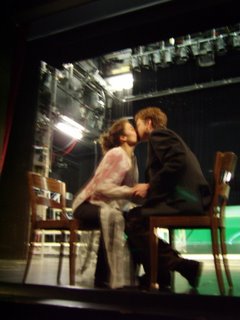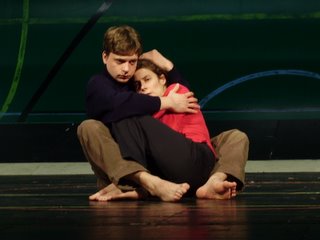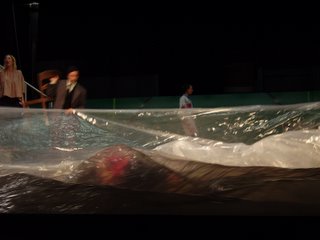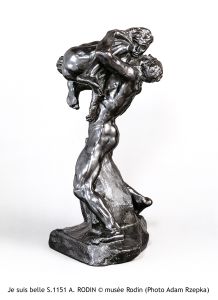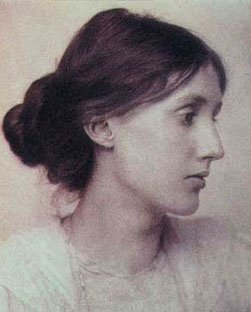by D. G. Myers
Originally published in Holocaust Literature: An Encyclopedia of Writers and Their Work, ed. S. Lillian Kremer (New York: Routledge, 2002). © 2002. All rights reserved.
Jean Améry (1912-1978) was a Jewish victim of the Nazis whose entire career was devoted to exploring and resisting the notions of Jew and victim. Although he rejected the advances of those who wished him to become a professional 
Jean Améry |
survivor, he equally scorned those who might deny that his Auschwitz number was "a basic formula of Jewish existence" or that the Holocaust is "the existential reference point for all Jews." An autobiographical and philosophical essayist whose texts are notoriously intransigent—hard to categorize, even harder to cherish—Améry wrote only one slim volume on the Holocaust. At the Mind’s Limits is one of the central texts, however, on Jewish victimhood.
Améry was born Hans Maier in Vienna on October 31, 1912. As a boy he made his home in his parents’ native Hohenems, a small resort city in the state of Vorarlberg, in the alpine provinces of western Austria. The family had been settled there since the seventeenth century. His great-grandfather, a Vorarlberg innkeeper and butcher, "spoke fluent Hebrew," according to his great-grandson. By the time of Améry’s birth, however, the Hebrew fluency had disappeared; the family was estranged from its Jewish origins, assimilated and intermarried. Améry’s father was more Austrian than Jewish. "The picture of him did not show me a bearded sage," Améry said, "but rather a Tyrolean Imperial Rifleman in the First World War." The father died in battle, in 1916, when his son was too young to remember him. Améry’s mother, who supported her only child and herself by keeping an inn, was Roman Catholic. "Several times a day she invoked Jesus, Mary, and Joseph," he says, "which sounded in our native dialect like ‘Jessamarandjosef.’"
Améry was educated in philosophy and literature in Vienna. He was studying there when the Nazis came to power in Germany in 1933. At once he immersed himself in the canonical writings of antisemitism and National Socialism; thus began, he said, "an entirely impossible éducation sentimentale for a young Jew. . . ." Coupled with the political situation in Austria, this reading deeply complicated Améry’s thinking about being Jewish. "I wanted by all means to be an anti-Nazi, that most certainly," he explains, "but of my own accord; I was not yet ready to take Jewish destiny upon myself. . . . I really found myself in a confusing state of mind: I was an Austrian who had been raised as a Christian, and yet I was not one." For the first time Améry began to understand himself as an outsider to the culture in which he lived. The decisive event was the promulgation, in 1935, of the Nuremberg Laws. Améry soon came to know the text of the laws by heart. "The overwhelming majority not only of the German people but also of my own Austrian people," he realized, "had excluded me from their community." But it did not follow that there was a place for him in the organized Jewish community. Orthodox Judaism was "another, thoroughly alien world." It was Christianity that drew him, because to be a Christian "means participation in our culture" (his emphasis). Judaism left Améry bored; "the synagogue was the Other." Over time, however, he became increasingly convinced that his intellect and "spiritual constitution" were Jewish—"not in the sense of upbringing or milieu," he says, "which in my case were as un-Jewish as possible, but by birth." This essentialist conviction, which he did not flinch at being described as racist, influenced his self-understanding for the rest of his life.
After the Anschluss in March 1938, Améry fled first to France and then, upon its defeat by the Germans in May 1941, to Belgium. There he joined the Resistance, although he later acknowledged that this was merely the last unconscious attempt to evade his Jewish identity. "The Jews were hunted, cornered, arrested, deported because they were Jews," he writes, underlining every word, "and only because of that. Looking back, it appears to me that I didn’t want to be detained by the enemy as a Jew but rather as a resistance member." And so in due course—in July 1943—he was arrested by the Gestapo for spreading anti-Nazi propaganda among the German occupation forces in Belgium. Améry believed he knew what was in store for him. He was widely read in the already substantial literature of the concentration camps. Whatever happened to him, he believed, would have merely to be "incorporated into the relevant literature, as it were." But nothing could prepare him for the experience of torture. Imprisoned in Fort Breendonk, Améry was interrogated by the SS for several days. His hands
Jean Améry |
were shackled behind him, and he was suspended by his wrists from a hook in the ceiling ("there was a crackling and splintering in my shoulders that my body has not forgotten until this hour. . . . I fell into a void and now hung by my dislocated arms, which had been torn high from behind and were now twisted over my head"). Then he was beaten with a horsewhip. Although he told the Gestapo nothing useful, it was not because of heroic opposition. He confessed everything; he even invented political crimes; but he knew only the aliases of his comrades in the Resistance and had no real information to divulge. Once they realized he was useless to them—once they realized he was a Jew and not just a political prisoner—the Gestapo shipped him off to Auschwitz.
Améry endured a year in Auschwitz III, the Buna-Monowitz labor camp. Lacking a manual skill, he was assigned to a labor detail at the I-G Farben site, digging dirt, laying cables, lugging sacks of cement and iron crossbeams. He survived—somehow. Unlike his fellow Auschwitz inmate Viktor E. Frankl, Améry refused to derive theory from his survival. Many years later he agreed that the "religiously or politically committed" (Orthodox Jews, orthodox Marxists) had a better chance of surviving, or at least of dying with more dignity. They were able to look beyond the basic reality of Auschwitz. For them the horrors were weakened by being reinterpreted as a renewal of creation when evil was released into the world or as natural political martyrdom. They had, in other words, a mode of transcendence that was anchored to a reality that the Nazis could not reach, because it existed in faith. "[W]hoever is, in the broadest sense, a believing person, whether his belief be metaphysical or bound to concrete reality, transcends himself," Améry says. "He is not the captive of his individuality; rather he is part of a spiritual continuity that is interrupted nowhere, not even in Auschwitz." But Améry was an unbeliever from first to last. He had nothing but himself to fall back upon. He was an intellectual, but confronted by a reality that could not be interpreted as anything other than horror, he found that intellect had lost its fundamental quality of transcendence. There was no other reality to which a mere intellectual could appeal. The claim of Auschwitz was total.
Améry was evacuated first to Buchenwald and then to Bergen-Belsen ahead of the advancing Red Army, and it was at Belsen that he was liberated in April 1945. Returning to Brussels, he passed the rest of his life outside the cultural mainstream. When he began to write for the German-language press of Alemannic Switzerland, he chose a "French-sounding pen name," a translation of Hans into French and an anagram for a common variant of his surname. The pseudonym signified his rejection of German culture, his identification with French; yet Améry continued to write in German. Even so, he refused to travel to Germany for two decades after the war. Only in 1964, at the urging of the German poet Helmut Heissenbüttel, who worked for the South German Broadcasting Corporation, did Améry finally break his silence in Germany, delivering a radio address on the intellectual in Auschwitz. It became the opening essay in Jenseits von Schuld und Sühne ("Beyond Guilt and Atonement"), his first and only Auschwitz book, which followed in 1966. Translated by Sidney and Stella P. Rosenfeld as At the Mind’s Limits, the book was published in English in 1980.
By then Améry had published five collections of journalism: Karrieren und Köpfe ("Careers and Heads: Portraits of Famous Contemporaries," 1955), Teenager-Stars ("Teenager Stars: The Idols of Our Time," 1960), Im Banne des Jazz ("Under the Spell of Jazz," 1961), Geburt der Gegenwart (also 1961, translated as Preface to the Future: Culture in a Consumer Society), and a study of Gerhart Hauptmann, "the eternal German" (1963). He estimated that he had published some 15,000 pages before he undertook At the Mind’s Limits. Only then did his literary career—his "entry into German literature," as he preferred to say—really begin. The Auschwitz book changed everything. He was fifty-four. At last he had found the literary identity he had been seeking since adolescence. If the book did not make him very much money, at least it made him famous. Suddenly he was in demand; he was invited to contribute essays, to deliver radio talks, to join conferences and symposia. "I have the suspicion," he said later, "that I merely struck a chord that began to vibrate just at a time when it was still fashionable to occupy oneself with the fate of the Nazi victims, and that [by the late seventies], when my friends on the Left are representing Israel as a universal plague and everyone’s sympathies are focused on the Palestinian resistance fighters, I couldn’t tempt a soul with this book."
At the Mind’s Limits released him from "the drudgery of writing articles." Améry could afford at last to take his time and to worry a subject—to write the things that were weighing upon him. The public, however, wanted to hear nothing else from him except more about victimhood. Améry was resistant. His newfound status was a "market phenomenon, hostile to the intellect"; and as such, it was a threat to him. He never again wrote at any length about Auschwitz. His next book, Über das Altern, was published three years later—in 1969. (On Aging was translated into English in 1994 by John D. Barlow.) Two years after that came Unmeisterliche Wanderjahre ("Lean Journeyman Years"). 
Améry’s grave in Vienna
Photo by Frantisek Zobray |
This chronological account of Améry’s intellectual development left a gaping hole at its center. It said nothing whatever about the years of the Holocaust. (It remains untranslated into English.) Améry describes these "slim volumes" as an "autobiographical trilogy." But they are not autobiography in any conventional sense. They omit "everything private and anecdotal." Améry does not tell stories about himself, but accepts his own pressing concerns as occasions for reflection and—to permit him his own emphasis—he "subjectively explore[s]" rather than objectively records his experience. He starts from the concrete event, but does not become lost in it. His later books are, in the words he used to describe At the Mind’s Limits, "personal confession refracted through meditation." He found his literary voice at last, in his fifties, and his "personal and intellectual life . . . became a contemplative essay." Two novels followed: Lefeu oder der Abbruch ("Lefeu, or the Demolition," 1974) and Charles Bovary, Landarzt ("Charles Bovary, Country Doctor," 1978). His philosophical inquiry on suicide, Hand an sich Legen, was published in 1976. Two years later—on October 17, 1978—Améry took his own life in Salzburg, and was buried in the Zentralfriedhof in Vienna. His Auschwitz number was engraved on the tombstone.
At the Mind’s Limits is neither a systematic nor a chronological treatment of Améry’s experience in the Holocaust. The hundred-page book consists of five essays, arranged in the order of their composition. They are held together not by careful organization but by a common theme, which Améry describes as "the subjective state of the victim." The title essay explores the fate of the mind in Auschwitz. "Torture" reaches back to narrate what Améry had undergone at Fort Breendonk. "How Much Home Does a Person Need?" takes a further step back to detail the psychic experience of the refugee. "Resentments" moves forward to take up the interior life of the victim after the Holocaust. "On the Necessity and Impossibility of Being a Jew" offers Améry’s conclusions on Jewish identity after a lifetime of being forced to confront the question.
Améry’s principal contribution to understanding the Holocaust is his concept of losing trust in the world. Perhaps better than any other Holocaust writer, Améry shows that the liberal pillars upon which Western civilization rests are not dug very deep; they are merely taken for granted. Political freedom and human dignity are measured by what is "possible and humanly acceptable"; they are temporary and hastily constructed social arrangements which disappear at the first blow aimed at a prisoner. "[W]e can live," Améry says, "only if we grant our fellow man life, ease his suffering, bridle the desire of our ego to expand." In the material security of our daily lives, we are unaware just how much we trust others to grant us life, and if not to ease our suffering at least not to cause it. But the victim of torture, the survivor of Auschwitz, has lost that trust forever. "Whoever was tortured, stays tortured," Améry concludes. He is indelibly burned with the knowledge that trust in the world—the trust that no one will lay hands on you—is astonishingly fragile, and can be lost at any moment. He knows something that they do not teach you in schools: that the Other can be absolute, and can exercise this absolute power by inflicting suffering.
For Améry, then, the Holocaust is central to human self-understanding because it represents not an accidental function of the Nazi regime, but its essence. Améry would have liked to "introduce certain Auschwitz books into the upper classes of secondary school as compulsory reading," because these books would introduce students to an idea that is indispensable to any humanistic curriculum in a post-Holocaust era—the idea of the victim, the "dead man on leave." If dignity is the right to live granted by society, then the Third Reich demonstrates how easily the grant can be revoked. Améry is not particularly interested in the perpetrators of the Holocaust. "The crimes of National Socialism had no moral quality for the doer," Améry explains. "The monster, who is not chained by his conscience to his deed, sees it from his viewpoint only as an objectification of his will, not as a moral event." Améry’s literary ambition in At the Mind’s Limits is to speak from the viewpoint of the victim, for whom the National Socialism had a moral quality. He seeks to understand suffering from the inside rather than extorting pity and special consideration for victims.
Améry thus stands as a challenge to the increasingly common view, of which the historian Peter Novick is merely one representative, that the Holocaust encourages contemporary Jews to adopt a "victim identity based on the Holocaust," a "fashionable victimhood" which is exploitative 
"The Jew Etc."
by R. B. Kitaj
(1976—unfinished)
Oil and charcoal on canvas, 60 x 48 |
and phony (see The Holocaust in American Life, pp. 190-202). While Améry certainly agrees that the existence of the Jews has been forever determined by the Holocaust, At the Mind’s Limits does not celebrate victimization. Instead, the book engages in a fundamental redefinition of victimhood. To be a victim is no longer to be the object of other people’s designs. In the sort of post-Holocaust thinking practiced by Améry, the Jewish victim makes himself the subject of his own history.
"Whoever attempts to be a Jew in my way and under the conditions imposed upon me," Améry says, "whoever hopes, by clarifying his own Holocaust-determined existence, to draw together and shape within himself the reality of the so-called Jewish Question, is wholly void of naiveté." Wholly void of naiveté because such a Jew is no longer lulled by "[d]eclarations of human rights, democratic constitutions, the free world and the free press." He no longer dwells in the illusion that human identity is something optional, like a Christmas gift that can be exchanged. He has learned that his identity—his personhood—is a necessity. "I . . . am precisely what I am not," Améry says, "because I did not exist until I became it, above all else: a Jew." "I became a person," Améry explains, "not by subjectively appealing to my abstract humanity but by discovering myself within the given social reality as a rebelling Jew and by realizing myself as one." Note the emphasis on rebelling. He is a Jew who grasps but also rebels against the social declaration that to be a Jew is to be sentenced to death. Another name for this sentence was Auschwitz. Thus Améry’s "phenomenological description of the existence of the victim," as he calls it in the preface to the first edition, is the exact opposite of the exploitation of victimhood. If the Jews now see their existence as having been determined by the Holocaust it is not that they have not adopted a "fashionable victimhood," but rather that they have become the necessary subject of their own drama. "Without the feeling of belonging to the threatened," Améry says, "I would be a self-surrendering fugitive from reality."
Although not halakhically a Jew, Améry insists nevertheless that being Jewish is a necessity for him. But it is also an impossibility, precisely because he is not halakhically Jewish; not, that is, a Jew as a member of a community. "With Jews as Jews I share practically nothing," he writes: "no language, no cultural tradition, no childhood memories." Perhaps then a "catastrophe Jew" rather than a halakhic Jew, or a "non-non-Jew": lacking faith in the God of Israel, lacking Yiddish or Hebrew, lacking the Jewish tradition, he is a Jew because he learned under the Nazis that he is not permitted to be anything else. To be a Jew and a victim—to be a Jewish victim—is to live without "positive determinants." But unlike most men and women, Améry was willing to live this way, because he was willing to see his thought through to the end.
According to Améry, the Holocaust assumed importance only later—a generation after the liberation of the camps—because the Jewish victims of the Nazis "were forced to relinquish" any sense of victory in the defeat of Germany. The rehabilitation of the nation that had been the Third Reich outstripped the rehabilitation of its victims. By the sixties, when he began at last to speak publicly on the camps, the world reaction to Germany and Israel made the discrepancy even more evident to Améry. While Germany had been rejoined to Europe, normalized and eventually to be reunited, Israel remained a pariah nation. The Holocaust was a wound that had not been healed. Améry occupied an "uncomfortable position between all of the parties," which suited his personality but made him difficult to rely upon. Readers on the Left were disgusted by his criticism of their side—he broke with the New Left over its support for terrorism and its sneering condemnation of Israel—while readers on the Right quite naturally understood him to be a subversive figure. Not that this disturbed Améry overmuch. To be a good writer, he believed, one must become independent of "all external signs of success." Starting with At the Mind’s Limits, all of his books venture into the "closed world" of suffering. Améry declines to offer "cheap consolation" or to find a redemptive message in suffering. His approach instead is unsparing, relentlessly bleak; "disconsoling," to use his word. And indeed it’s difficult to know why anyone at all reads these books—except perhaps to face the truth.



